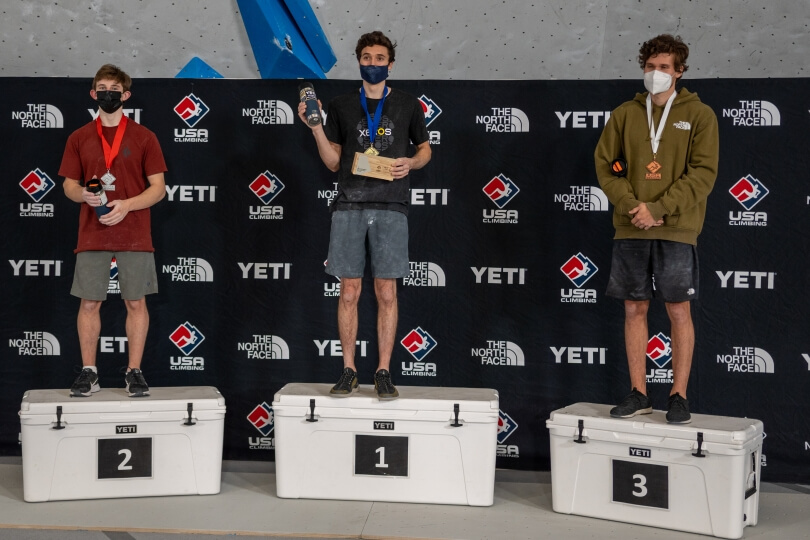As a two-time national rock climbing champion, Jesse Grupper knows all about the limits of human mobility and biomechanics. Not everyone possesses the strength, coordination and flexibility required to achieve such heights. For those recovering from stroke, even performing everyday tasks of daily living can be a challenge.
Jesse Grupper (Credit: Jesse Grupper)
In his day job, Grupper works to help others regain and improve their own mobility. As a research fellow in Prof. Conor Walsh’s Harvard Biodesign Lab at the Harvard John A. Paulson School of Engineering and Applied Sciences (SEAS), he has worked on multiple projects designed to restore movement to individuals who have suffered strokes.
“It’s always been exciting to me to be on the edge of human capability,” Grupper said. “When you go into a competition, the only thing you can control is what you do and what your outcome will be. I think being able to push myself gives me an appreciation for what it takes to improve. Having that appreciation and applying it to robotics gives me the vantage point of how much work it will take to develop this technology to help people reach new capabilities or heights.”
Grupper began climbing when he was 6 years old and was climbing competitively by the age of 9. He won his first youth national championship at the age of 11 in 2008. Growing up in New Jersey, climbing was a perfect outlet for his energy, requiring both physical skill and mental focus. After graduating from Tufts University with a degree in mechanical engineering in 2019, Grupper competed on the international rock climbing circuit but found he wanted to do more than just focus on his own training.
“I really missed that ability to positively affect other people’s lives, and I know that I need that motivation day-to-day to push myself as well as others,” he said.
When Grupper joined the Harvard Biodesign Lab in August 2020, his first project was a soft robotic glove to help stroke victims with their rehabilitation.
Grupper helped deploy the glove to patients in their homes, performed debugging and repairs when necessary, and assisted with the overall study. His next project also was for stroke victims, this time an ankle device to help with their stride.
“Jesse’s fantastic,” said Walsh, the Paul A. Maeder Professor of Engineering and Applied Sciences at SEAS. “He’s very passionate about the intersection of technology and biomechanics, and how to help people who have some type of physical disability.”
Research fellow Jesse Grupper competes during the USA Climbing National Championships in November 2021 in Salt Lake City, Utah. (Credit: Bree Robles)
Jesse Grupper started competitive rock climbing when he was nine years old. He won his first youth national championship two years later in 2008. (Credit: Bree Robles)
Grupper’s latest national championship was in the lead climbing division, in which climbers attach their ropes at increasingly higher points as they scale the route. Lead climbing requires planning, strategy and improvisation as one ascends.
“You have a designated start hold and finish hold,” he said. “There are holds you can use in between, but there are a lot of different ways to get to the top depending on how you use the holds and navigate your way up. I loved that problem-solving aspect of it as well, and I was really drawn to that.”
That approach to problem-solving translated to an interest in engineering.
Research fellow Jesse Grupper stands on the podium after winning the USA Climbing National Championship in November 2021 in Salt Lake City, Utah. (Credit: Bree Robles)
“A lot of engineers or scientists that have to do problem-solving at work also enjoy doing it in the gym and outside,” he said. “It’s also nice to have that next challenge to set my sights on, and that’s the link for me between research and climbing.”Grupper arrived at Tufts wanting a hands-on scientific field, one that could directly benefit the end user. Mechanical engineering offered the opportunity to, as he put it, “gain a lot of skills fast.”
He’s put all of those skills to work in the Walsh Lab.
“That’s the beauty of Conor’s lab, doing biodesign, robotics and also adding in the human-interaction component,” he said. “Being able to not just focus on one discipline, but to have an interdisciplinary space where engineers, therapists and researchers can all come together to tackle complex challenges that make people's lives better."
Working at Harvard and maintaining his competitive climbing life is a balancing act, but Grupper knows quite a bit about setting lofty goals and reaching for new heights.
“Jesse has the personality, enthusiasm and motivation to really make a big impact in the area of assistive technology,” Walsh said. “He wants to continue to refine his skills and build up his technical expertise so he can be the best engineer, designer and innovator that he can be. I’m convinced he’s going to continue on an upward trajectory, and once he’s able to combine that strong expertise with his approach and personality, I think he’ll be in a great position to make a big impact.”
Press Contact
Matt Goisman | mgoisman@g.harvard.edu


